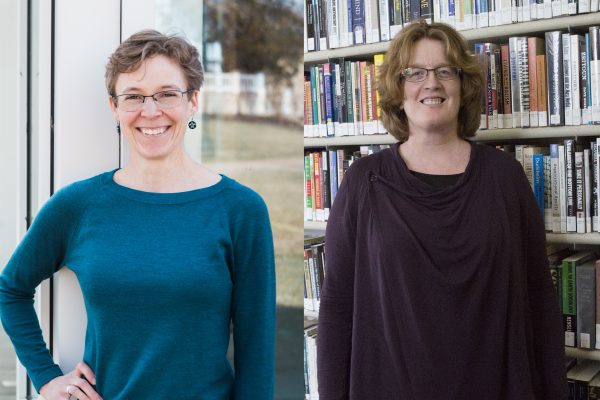Better together: Team-teaching at Cornell College
Cornell College professors Erin Davis and Emily Walsh teach and research very different topics, but they’re finding unique ways to collaborate through team-teaching.

Walsh studies geology, while Davis specializes in sociology. They say these disciplines are great lenses through which to study sustainability.
“The study of rocks and the study of people do not initially appear to have much in common. People don’t tend to think about them together,” Walsh said. “But, they actually fit really well together.”
“You can’t talk about environmental issues without talking about the earth and people,” Davis added.
Several years ago the two started bringing together their individual classes once a week, but they eventually decided to completely combine the classes to team-teach an interdisciplinary course using geology and sociology to study consumption. The course was called Cell-Phones, Coffee, and Cars: Critiquing Consumption.
“For me, this is all about innovative problem solving,” Davis said. “We focus on an issue and think about the complexity of the issue. There are social components and environmental, geological components to that. I think this really allows students to see how complicated issues can be and to understand how you can approach issues from different perspectives.”
The class works on a project throughout the block, exploring items people use everyday, such as water bottles or cell phones. They find out which resources from the earth are used and processed for each item and think through why and how people use them.
The professors are both in every class, combining their knowledge to create lessons. They’ve learned a lot from each other on their areas of expertise and their teaching styles.
“It’s interesting because we have different approaches, which I think are complimentary but you have to figure that out during a team-taught course,” Davis said. “Emily is much more of a facilitated lecturer, and I’m more of a discussion-based professor. We each have our own styles that combine perfectly for the course.”
The professors also say the block system makes this kind of collaboration possible by allowing them to take day-long field trips off campus and to design the class to fit the material taught each day. In the past two years, it was offered as a first-year seminar course, which has also helped students through their studies.
“It gets them thinking on an interdisciplinary level and then when they are taking their major courses later, they have a sense that it’s one part of the puzzle. It allows them to think about the integration of all of the courses they take,” Walsh said.
The professors are actively spreading the word about the benefits of team teaching through a paper in the Journal of Geoscience Education, through a webinar, and conferences. They especially hope to be an example of how two very different disciplines can collaborate to problem-solve and create life-long learning lessons.



